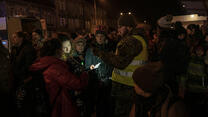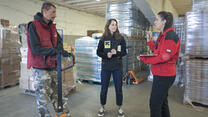
Our response to Russia’s invasion of Ukraine, which has killed at least 700 civilians and displaced more than 3 million people so far, is no different. Our team quickly deployed to neighbouring Poland, where they are scaling up resources and mobilising partners in both Poland and Ukraine to assist people who had to flee their homes.
Even before the attacks on Ukraine, the world had been facing unprecedented humanitarian needs. A record 80 million people around the world have been uprooted by crises. Some 41 million people in 43 countries are on the brink of famine. Wars around the world are lasting longer and becoming more complex, with civilians paying the price.
Against this backdrop, and with so many urgent crises in the world, how does the IRC decide whether to respond to an emergency? How do we choose what aid we will deliver? And what is the best way to support our work?
Below, our emergency team answers some of our supporters’ most common questions. We will update this space with new details on our Ukraine emergency response as they come in.
What does the IRC consider an emergency?
The IRC defines emergencies as "emerging humanitarian crises or deteriorating situations in which existing services are overwhelmed and communities’ access to basic needs are unmet.”
Emergencies can be man-made crises - such as the Russian invasion of Ukraine or the conflict in Syria - or natural disasters, such as the 2011 earthquake and tsunami in Japan or the ongoing drought in East Africa. Emergencies can strike suddenly, or they can build up over time.
How does the IRC prepare for emergencies?
Our emergency team monitors emerging crises throughout the year. We create assessments of countries, including for our annual Emergency Watchlist of the 20 humanitarian crises most likely to deteriorate in the year ahead.
The IRC emergency team also works with our programme teams in 40+ countries around the world. We help them to create crisis plans and train them in how to respond to emergencies so they are ready to act at a moment’s notice.
In addition, our global emergency specialists - doctors, engineers, social workers and logisticians - are on standby ready to deploy within 72 hours. The emergency team’s work is supported by flexible funding from IRC supporters as well as a dedicated Crisis Response Fund.
How does the IRC decide to respond to an emergency?
When an emergency strikes, we aim to answer two key questions: first, how severe is the crisis? And second, should the IRC respond? Our emergency team uses concrete data to make that decision.
To understand the severity of a crisis, we look at the available information, such as the number of people killed, the number injured, the number displaced from their homes, and the number affected in other ways. Then we look at the resources the community affected by crisis already has, such as support from the government or local organisations, and determine if the IRC’s expertise and resources are needed.
“If we’re on our game, it takes less than one-half hour to make a decision to go into a completely new country,” said IRC director of emergencies Bob Kitchen in a 2018 episode of the IRC podcast Displaced.
How does the IRC decide what aid to provide?
We ask the people who are directly impacted by the crisis. They are the most important experts. Our emergency response won’t be successful unless we listen to them and understand exactly what they need.
“We know from decades of experience that if we come in and just project our knowledge and our values onto a crisis, we’re going to end up doing the wrong thing at the wrong time,” said Kitchen. “And those activities won’t be embraced, and they won’t make a difference. They won’t save lives because they’re not the people’s priorities.”
We know from decades of experience that if we come in and just project our knowledge and our values onto a crisis, we’re going to end up doing the wrong thing at the wrong time.
We know from decades of experience that if we come in and just project our knowledge and our values onto a crisis, we’re going to end up doing the wrong thing at the wrong time.
We also rely on information from IRC colleagues working in countries where we already have a presence. 99% of staff in each of our country programmes come from those countries and serve their own communities. During a crisis, they work alongside the emergency team and provide critical local insights.
Where the IRC doesn’t already have a presence in a country, we talk to communities and to groups that may include local nonprofits and government officials. We try to get up to speed on people’s needs as quickly as possible while also moving rapidly to provide vital aid.
Often, the IRC partners with and provides support to local organisations already active on the ground. This bolsters the crisis response of people who have already been working in the community and are experts on the local context.
“It’s a process that can be summed up in three words,” said Kitchen. “We ask. We listen. And we act.”
What do people impacted by the war in Ukraine need?
Since the Russian invasion of Ukraine started on 24 February, bombs and shelling have continued to escalate - deliberately targeting civilians, residential buildings, hospitals and essential infrastructure. Thousands of people are left without adequate water or electricity. Many can’t reach markets to buy food and basic supplies because roads and bridges have been destroyed.
Over 2 million people have now fled Ukraine to seek safety in neighboring countries. The majority are women, children and elderly people. Huge numbers of people continue to arrive at Ukraine’s borders with Poland, Romania, Hungary, Slovakia and Moldova with only what they can carry. In many places there are long waits to cross and scant facilities waiting for them on the other side, with temperatures dropping below freezing overnight. Urgent needs include food, water, emergency shelter, health care and sanitation facilities, and protection and trauma counselling.
How is the IRC helping in Ukraine?
The IRC is on the ground in Poland, and working with local partners in both Poland and Ukraine to meet the immediate needs of people affected by this conflict.
We are currently working through partners to provide critical information services to some of the 1 million people that have arrived in Poland from Ukraine. We are also procuring medical supplies and essential items such as sleeping bags and blankets for distribution at reception centers on the Ukrainian/Polish border.
In Ukraine, we are working to quickly mobilise resources and connect with partners to establish a response that will provide lifesaving support to civilians forced to flee their homes.
We know when a crisis strikes, women and children are always the most at risk of exploitation and violence, so we are working to ensure they are protected and survivors of violence have the support they need.
What is the best way to support the IRC’s work?
The best way to support the IRC’s work is to donate to us, so we can continue to support local organisations and to make sure people travelling to Poland and those still inside Ukraine have access to urgently needed humanitarian assistance.
Why do aid organisations like the IRC prefer cash donations?
Cash donations are the most efficient way for humanitarian organisations like the IRC to provide assistance to those in need. Read more on the Center for International Disaster Information website.
Can I donate supplies?
We are grateful for offers of support; however, we are not able to accept gifts of goods or supplies. Wherever possible we try to procure goods and services close to the communities we serve; this helps us to make sure our response programmes are good value for money and can help keep the local economy moving after a crisis.



